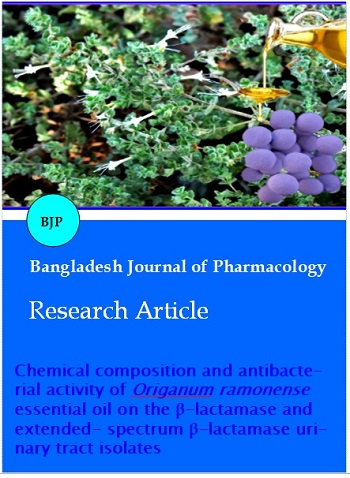Chemical composition and antibacterial activity of Origanum ramonense essential oil on the β-lactamase and extended- spectrum β-lactamase urinary tract isolates
DOI:
https://doi.org/10.3329/bjp.v13i3.36897Keywords:
Antibacterial, Essential oil, Origanum ramonense, Urinary tract infectionAbstract
The aim of this study was to evaluate the antibacterial activity of Origanum ramonense essential oil extracted from the air-dried leaves against β-lactamase and extended-spectrum β-lactamase obtained from the patients with urinary tract infection. The essential oil was extracted by hydrodistillation and analyzed by GC–MS. In vitro antibacterial activity was studied using disc diffusion and microdilution methods. Twenty compounds were identified representing 97.8% of the total oil. The major components were carvacrol (84.6%), p-cymene (4.3%) and γ-terpinene (3.3%). The oil showed a broad spectrum of antibacterial activity against all tested isolates. Staphylococcus aureus, S. epidermidis, Klebsiella pneumoniae and Enterobacter aerogenes had the lowest minimum inhibitory concentration values (0.015 µg/mL) followed by Escherichia coli (0.14 µg/mL). The lowest susceptible strains to oil were Pseudomonas aeruginosa, Proteus mirabilis, E. coli 25922 and P. aeruginosa 10145. The bacteriostatic and bactericidal effects at concentrations as low as 0.015 µg/mL indicated the potent antibacterial activity of O. ramonense.
Video Clip of Methodology:
Disc Diffusion method: 2 min 16 sec Click to watch
Downloads
185
169 Read
41

Published
How to Cite
Issue
Section
License
Authors who publish with this journal agree to the following terms:
- Authors retain copyright and grant the journal right of first publication with the work simultaneously licensed under a Creative Commons Attribution License that allows others to share the work with an acknowledgement of the work's authorship and initial publication in this journal.
- Authors are able to enter into separate, additional contractual arrangements for the non-exclusive distribution of the journal's published version of the work (e.g., post it to an institutional repository or publish it in a book), with an acknowledgement of its initial publication in this journal.
- Authors are permitted and encouraged to post their work online (e.g., in institutional repositories or on their website) prior to and during the submission process, as it can lead to productive exchanges, as well as earlier and greater citation of published work (See The Effect of Open Access).
